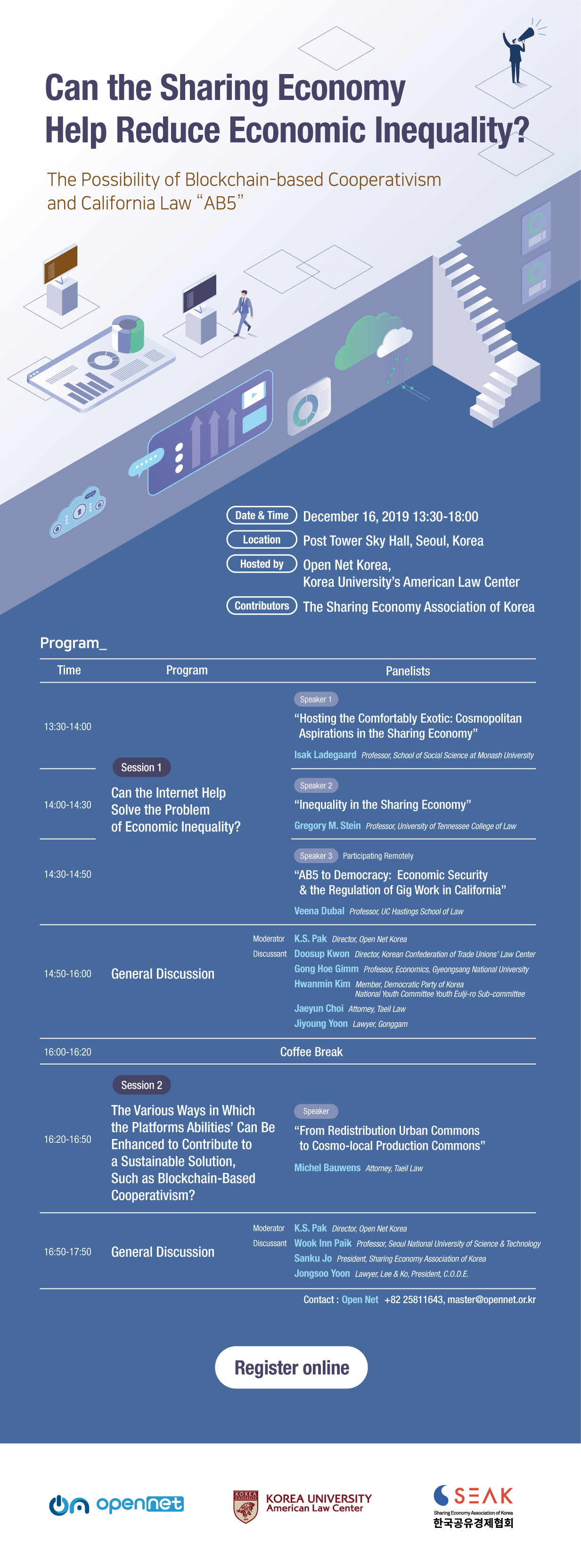
Open Net will be hosting a seminar on the topic of ‘Can the Sharing Economy Help Reduce Economic Inequality?’ on December 16, 2019. The seminar is open to all those interested, and registration is free of charge. Simultaneous translation will be provided. You can find out more about the seminar below, and register through the link provided.
* click to register: https://forms.gle/JVnuaZ9RofD9GxB46
Can the Sharing Economy Help Reduce Economic Inequality?
Date and Time: December 16, 2019 13:30-18:00
Location: Post Tower Sky Hall, Seoul, Korea
Hosted by: Open Net Korea, Korea University’s American Law Center
Funded by: The Sharing Economy Association of Korea
The sharing economy, at its beginning, seemed to promote shared access to goods such as cars and housing. Now that the dust has settled, it seems that the essence of what became shared was in fact labor. Cars, houses, and even natural resources can have value only with the input of labor that goes into developing them. The central claim of the disruptive economy was to fragment labor, strengthen information sharing among the mass, provide services super-closely tailored to demand, and thereby increase the social welfare in the microeconomic sense.
However, the price-competitiveness of the disruptive economy drove people with traditional jobs into unemployment, with higher numbers of people being involved in productive activities, but mostly only in the unskilled labor stages.
Then again, the sharing economy continues to have the equalizing potential in its ability to include more people into the labor market and lets them choose from a broader range of jobs and working hours. At the current stage, the discussion of what ways the sharing economy can meet the idealistic goals that were envisioned is needed, as well as a reevaluation of whether such changes contribute to economic inequalities. It is also past due time to discuss new laws and regulations that can protect the participants in the sharing economy as either employees or independent contractors.
As such, Open Net has invited professionals in the field of the sharing economy to shed light on these issues.
[Session 1] Can the Internet Help Solve the Problem of Economic Inequality? (2.5 hrs)
We discuss the relationship between newly emerging internet-based industries and the industries that are being replaced amid the diversification of product producers and service providers. The sharing economy has the potential to give laborers the opportunity needed to become independent contractors, but also has the possibility of reducing laborers to tools used to enlarge the pool of irregular workers. We explore the possibility of a legal frame to ideally respond to the expansion of the sharing economy.
- Moderator: KS Park, Professor, Korea University Law School
- Speaker: Gregory M. Stein, Professor, University of Tennessee College of Law
- Speaker: Isak Ladegaard, Professor, Monash University
- Speaker: Veena Dubal, Professor, UC Hastings School of Law (participating remotely)
- Discussant: Gong Hoe Gimm, Professor of Economics, Gyeongsang National University
- Discussant: Hwanmin Kim, IT Labor Activist, Member, Democratic Party of Korea National Youth Committee Youth Eulji-ro Sub-committee
- Discussant: Doosup Kwon, Director, Korean Confederation of Trade Unions’ Law Center
- Discussant: Jaeyun Choi, Lawyer, Taeil Law
- Discussant: Jiyoung Yoon, Lawyer, Gonggam
[Session 2] The Various Ways in Which the Platforms Abilities’ Can Be Enhanced to Contribute to a Sustainable Solution, Such as Blockchain-Based Cooperativism (1.5 hrs)
It is ironic that platforms themselves are being recognized as the subject of concentration of economic power as the sharing economy model growth centers around platforms. We discuss blockchain-based cooperativism which has been rising as the solution to such problems.
- Moderator: KS Park, Professor, Korea University Law School
- Speaker: Michel Bauwens, Founder of the P2P Foundation
- Discussant: Wook Inn Paik, Professor, Seoul National University of Science & Technology
- Discussant: Jongsoo Yoon, Lawyer, Lee & Ko, President, C.O.D.E.
- Discussant: Sanku Jo, President, Sharing Economy Association of Korea


0 Comments